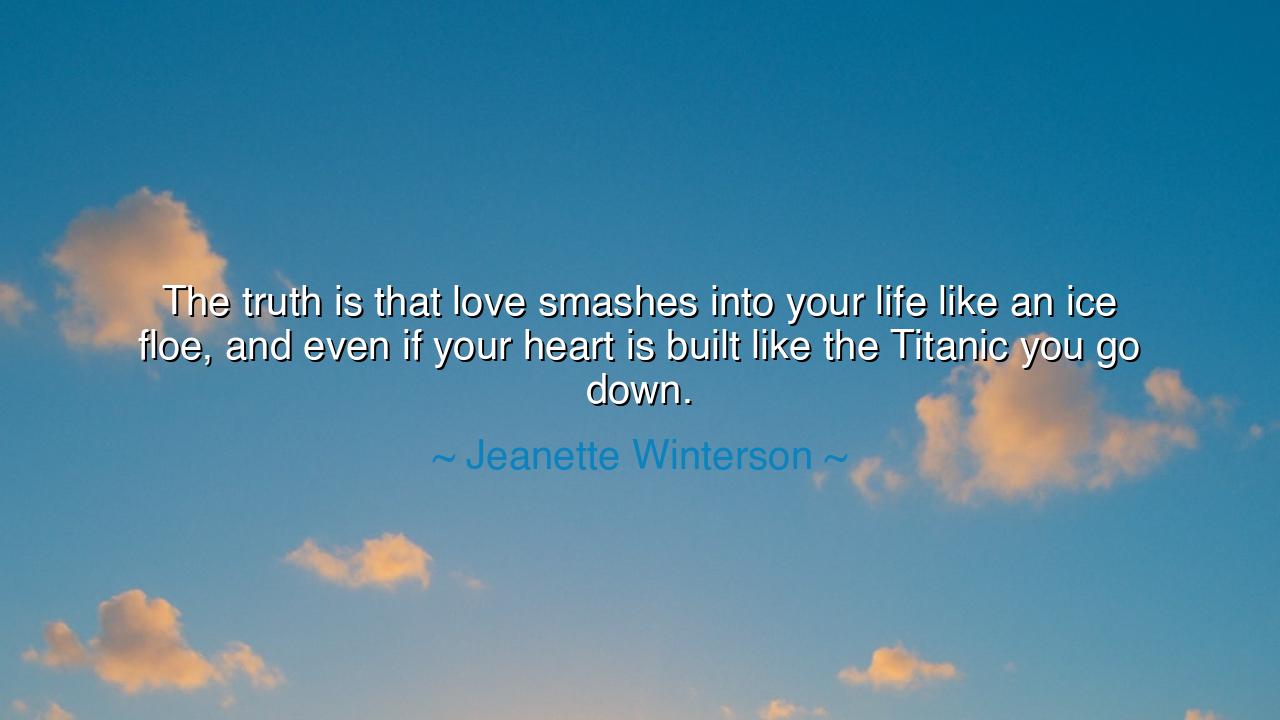
The truth is that love smashes into your life like an ice floe
The truth is that love smashes into your life like an ice floe, and even if your heart is built like the Titanic you go down.






Jeanette Winterson speaks a truth that cuts through the heart with the sharpness of a winter storm: “The truth is that love smashes into your life like an ice floe, and even if your heart is built like the Titanic, you go down.” These words are a powerful metaphor for the overwhelming and often unpredictable nature of love. Love, like a massive ice floe, does not gently drift into our lives. It crashes, forcefully and without warning, shattering the quiet waters of our existence. And even if we believe ourselves to be strong, even if we feel that our hearts are as indestructible as the grand Titanic, love has a way of bringing us to our knees. The truth Winterson speaks is that love is not controlled or manageable—it is a force of nature, wild and unstoppable, and it does not care for the strength of the vessel that holds it.
In the ancient world, the wise ones spoke of the power of love, often describing it as a force that could not be tamed. The gods themselves were sometimes ruled by love, and even the mightiest of men were brought low by it. Plato spoke of love as a divine madness, a state that could elevate the soul to the heavens or destroy it utterly. Socrates too, in his reflections on love, recognized that it was not something that could be captured or held—it was something that happened, something that consumed those who were touched by it. Love, in its most potent form, does not ask for permission—it forces its way into our hearts and shapes us in ways we cannot foresee or control. And much like the Titanic, we often find ourselves unprepared for the impact.
Consider, O children, the story of Helen of Troy, whose love for Paris led to the fall of the greatest city in the ancient world. Her love, though it began as a simple, perhaps innocent desire, soon grew into something unstoppable and devastating. She was swept away by it, and the mighty city of Troy, with all its fortifications and defenses, was brought down. Helen’s love did not care for the strength of Troy, nor for the consequences of her choices. It smashed into her life like an ice floe, and the result was a tragedy that changed the course of history. Though Troy was built to withstand sieges and storms, it was not built to withstand the power of love. This is the truth that Winterson speaks: no matter how strong or fortified we believe our hearts to be, love can bring us to ruin if we are not careful.
The tragedy of Romeo and Juliet offers another example of love’s destructive force. These two young lovers, though their hearts were strong, were not prepared for the storm of emotions that came crashing into their lives. Their love was pure and deep, yet it destroyed them both, because they were too young and too passionate to understand the depth of the power they held. Their hearts, though full of love, were untested by the world, and when love came crashing in like an ice floe, there was nothing they could do but surrender. Their love was a beautiful thing, but it was also dangerous—it led to misunderstanding, betrayal, and ultimately death. In this way, love can be both a savior and a destroyer, lifting us to great heights but also pulling us down into the deepest of abysses.
Winterson’s quote also speaks to the inevitable nature of love’s impact. The Titanic, with its seemingly invincible strength, was no match for the unexpected force of the iceberg. Similarly, no matter how strong we believe ourselves to be, love will come, and it will crash against our hearts. It will reshape us, break us down, and rebuild us in ways we cannot control. The heart, no matter how fortified, is always vulnerable to the impact of love. But it is this vulnerability that makes love beautiful, for it is in the surrender to love that we discover the most authentic versions of ourselves. To love is to admit that we are not in control, that we are subject to forces beyond our understanding.
The lesson here, O children, is not to fear the force of love, but to embrace it with open arms, understanding that it will change you. To love is to allow yourself to be vulnerable, to be open to the impact of something greater than yourself. We cannot protect ourselves from the force of love, but we can choose to welcome it, to accept its transformation, and to learn from the chaos it brings. Love is not always kind, nor gentle, but it is always authentic. It reveals the depths of our souls and the strength of our hearts. Through love, we learn who we truly are, and it is in the crash of love’s ice floe that we find the truth of our existence.
So, let your hearts remain open, O children, even when love comes crashing in. Know that while it may break you, it will also remake you. Allow love to smash into your life, for in doing so, you will uncover parts of your soul that you never knew existed. Do not be afraid of the storm love can bring, for it is in the storm that we find our greatest strength, our most authentic selves. The Titanic of your heart may go down, but what rises from the depths will be something more beautiful than you can ever imagine.






AAdministratorAdministrator
Welcome, honored guests. Please leave a comment, we will respond soon